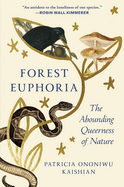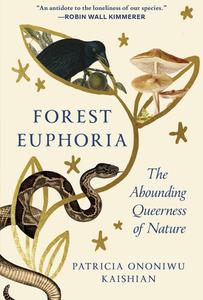
 Patricia Ononiwu Kaishian's insights about the natural world and her skill in presenting them are nothing short of stunning. Forest Euphoria: The Abounding Queerness of Nature undermines the constrained, ideologically limited lens that cultural norms have imposed upon science and its exploration of nature throughout history. In Kaishian's work, the term "queer" is "a call to action, charging us to reject the many binaries that shape our current reality to the detriment of everyone."
Patricia Ononiwu Kaishian's insights about the natural world and her skill in presenting them are nothing short of stunning. Forest Euphoria: The Abounding Queerness of Nature undermines the constrained, ideologically limited lens that cultural norms have imposed upon science and its exploration of nature throughout history. In Kaishian's work, the term "queer" is "a call to action, charging us to reject the many binaries that shape our current reality to the detriment of everyone."
Part of the binary that Kaishian powerfully disputes is the dominant hierarchical concept of "human exceptionalism," in which it's considered a given that anything present in the natural world exists to be in service to human beings and not as entities of their own. Her argument is a radical reconception of the traditional understanding of the natural world, and is one found throughout the growing arena of deep ecology. Kaishian credits native knowledge and her time at ESF, the Environmental Science and Forestry program at SUNY Syracuse, where she worked with fungal taxonomist Alex Weir and learned how to "decolonize" her own practice of science.
Using case studies from the natural world (corvids, fungi, eels, etc.), which she's studied throughout her development as a mycologist, Kaishian achieves something truly singular. She establishes a kaleidoscopic vision of interconnectedness that encompasses intricate webs of communication and cooperation, while acknowledging that much always remains to be discovered. Not remotely dry, Forest Euphoria is an evocative work of profound creativity that combines scientific rigor, personal narrative, and a call for an outlook that is better, more inclusive, more true and genuinely scientific.
The examples are varied and captivating, for instance: "It is common for a fungus to have more than two biological sexes, and some fungi, such as Schizophyllum commune, have as many as twenty-three thousand mating types. When two compatible fungi meet, their threadlike mycelia will fuse into a single body, exchange genetic information through sexual recombination, then remain somatically one as 'they' continue to live, grow, and explore their environment."
The forest, in Kaishian's rendering, is not a static backdrop to be harvested, but a dynamic character, a living testament to these kinds of connections that challenge the prevailing historical themes of competition and hierarchy.
Never shying away from the complexities of the subject matter, Kaishian develops her arguments with clarity and passion, inviting a generalist audience to share in the love and stewardship of all aspects of the natural world. Forest Euphoria is not just for scientists or academics; it's for anyone who cares about the future of our planet, anyone who is willing to question the assumptions that have contributed to our current environmental crisis. -- Elizabeth DeNoma, executive editor, DeNoma Literary Services, Seattle, Wash.
Shelf Talker: Forest Euphoria is an irresistible and intimate celebration of the varied vastness of life throughout nature.

